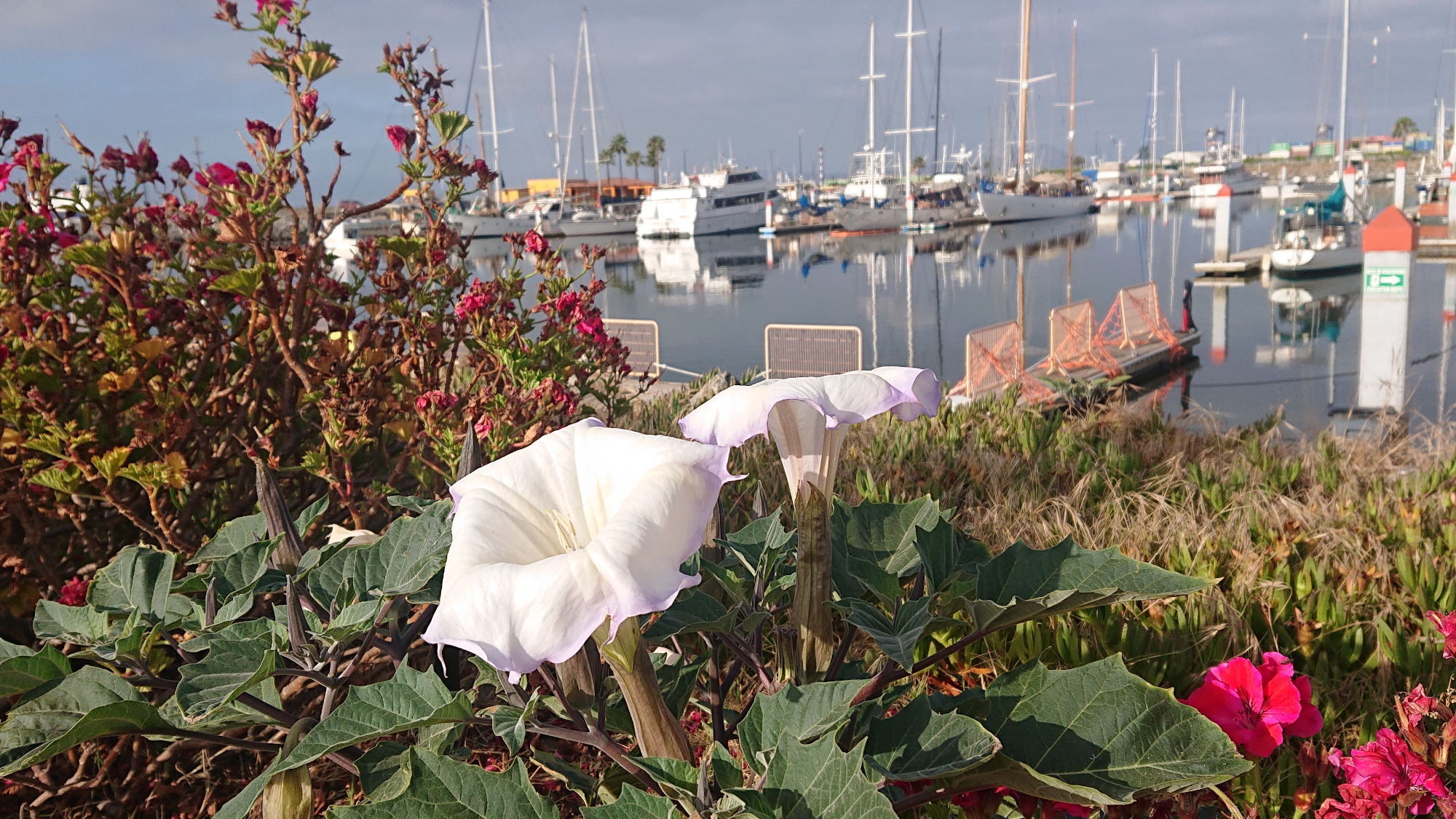The Spring flowers are fading in the marina and setting seeds, but my desire to photograph continues. As the plants move onto the next stage of the cycle of life, they have different photogenic qualities.
The next round of emerging plants seem at first glance less desirable to the senses. Having grown up with farmers and gardeners, the summer plants growing in the marina surrounds are predominantly what would be classified as “weeds.” These self sewn plants are surviving despite the lack of good soil quality and rain. They are presenting their own amazing beauty despite the fact that, if they were in a garden or a farmer’s paddock, they would be less than desirable. As the English proverb states- “One man’s trash is another man’s treasure.”
I present to you this stramonium plant as an example. The beautiful lilac trumpet flowers, from the nightshade family, unfurl at night and show their glory.
Then, they fall from their one night’s fame …
and reveal a large spiky seed pod which some people might refer to as “bommy-knockers.”
One of Harry’s first paid jobs when at high school was to chip these plants from sorghum paddocks on the Darling Downs, Queensland. They were so large, they were competing for the moisture from the sorghum crop. The farmers did not want these seed pods maturing to propagate more stramonium in their paddocks. According to Wikipedia common names for this plant from a variety of regions include thorn apple, moon flower, hell’s bells, devil’s trumpet, devil’s weed, stink weed, locoweed, prickly burr, false castor oil plant, and devil’s cucumber. The nicknames predominantly express the plant as “trash”, something you would not desire to grow. However to my photographer’s eye they are indeed a “treasure” to behold – a moon flower.
Perhaps this plant could also provide us with analogies to life.
We have to take the thorns and prickles of life along with the glory and the beauty. One does not exist without the other. Life is not always easy. Sometimes we have to develop effective strategies to survive.
When life throws bommykockers – look for the glorious trumpeting flowers.
We can complain about the stramonium having spiky seedpods; or we can rejoice that the spiky seedpods grow into plants that produce glorious, unfurling, trumpet flowers.
Hoping we can all behold the “treasures” of life, in these present less than perfect “trashy” times.





















Hello my friend,
Always a learning experience with Leticia. Thank you. Looks like all is well. Love to you and Harry ❤
Leticia,
I look forward to your posts and they always lift my spirits…
Thanks and love to you and Harry
Elizabeth
Nice to know I am spreading good vibes in other places. xoxo
Leticia,
Thank you for sharing your journey and experiences. You are an amazing photographer and writer. I always look forward to your blog. Safe travels my friend.
Lovaun
I hope you are staying safe too. I feel privileged to have the time to photograph, write and share.
What a delightful read! I was reminded of the other saying that says something like “weeds are just flowers in the wrong place”. Glad to know you are still inspired to photograph your surroundings and find beauty in what you see. Looking forward to your next post.
Sending love and hugs to you both
Indeed. Sending love your way too. Thank you for reading my blogs. I appreciate your comments.
Beautifully put analogies to how Attitude is everything, just shared ❤️🙏🏻😊
Thank you for the compliment. I am glad you were able to share it with others.
Beautiful photos as always. The unfurling trumpets are a marvel! It’s a shame that some of the most virulent weeds are so pretty and we always smile when we see lantana growing in european gardens.
Yes. The prickly pear in Australia is another example of introduced species causing issues.
I love reading your beautiful words and seeing your gorgeous photos. I love and miss you so much ❤️
Thank you for sending your love and kind words.